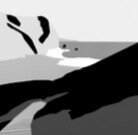September Williams, MD is a Black American physician-writer, bioethicist, and filmmaker. Her work promotes narrative inquiry in bioethics through stories that are diverse, humanitarian, and scientifically imbued.
September Williams MD-Writer, Chasing Mercury (photo by Marta Johansen)

